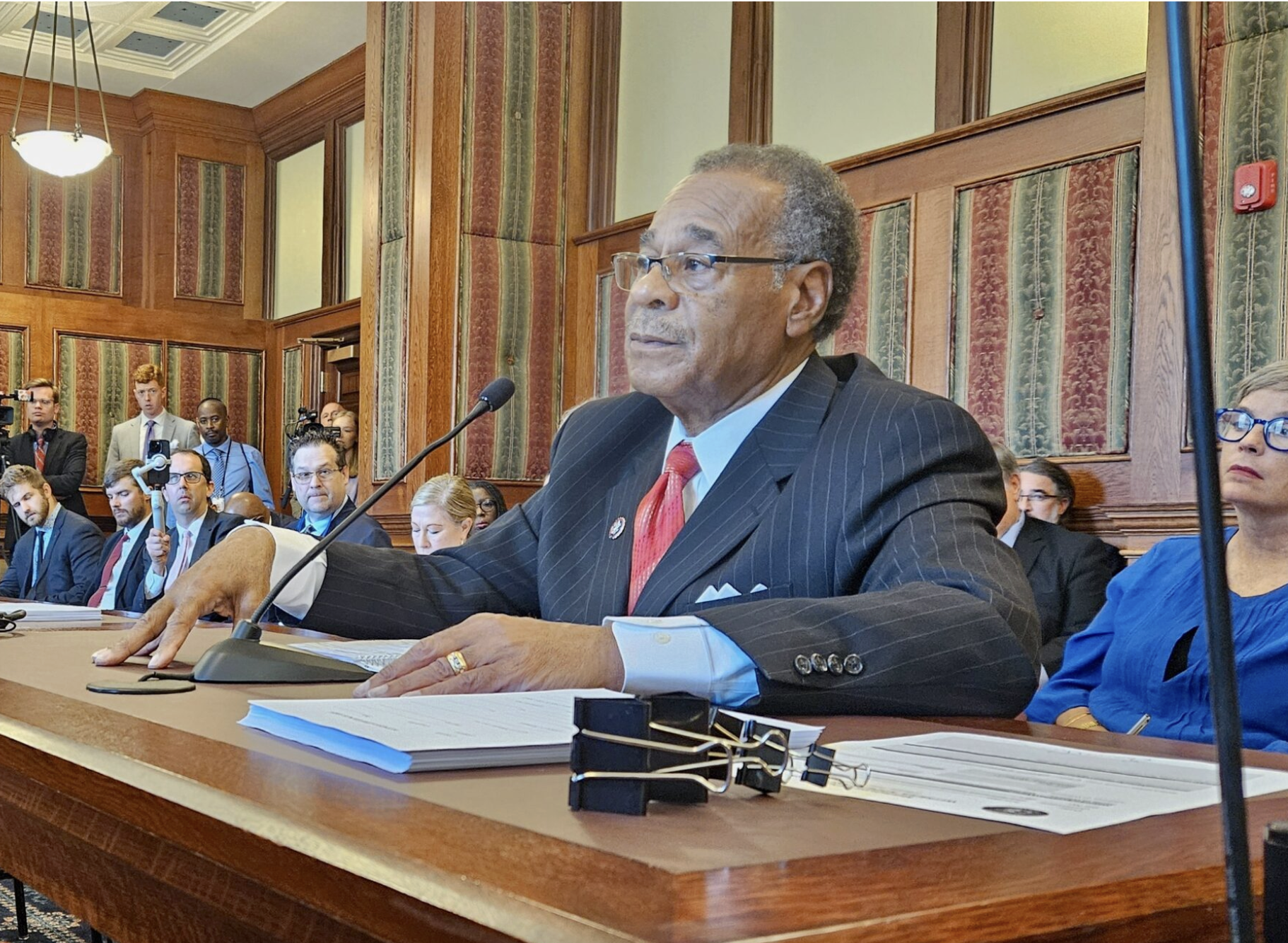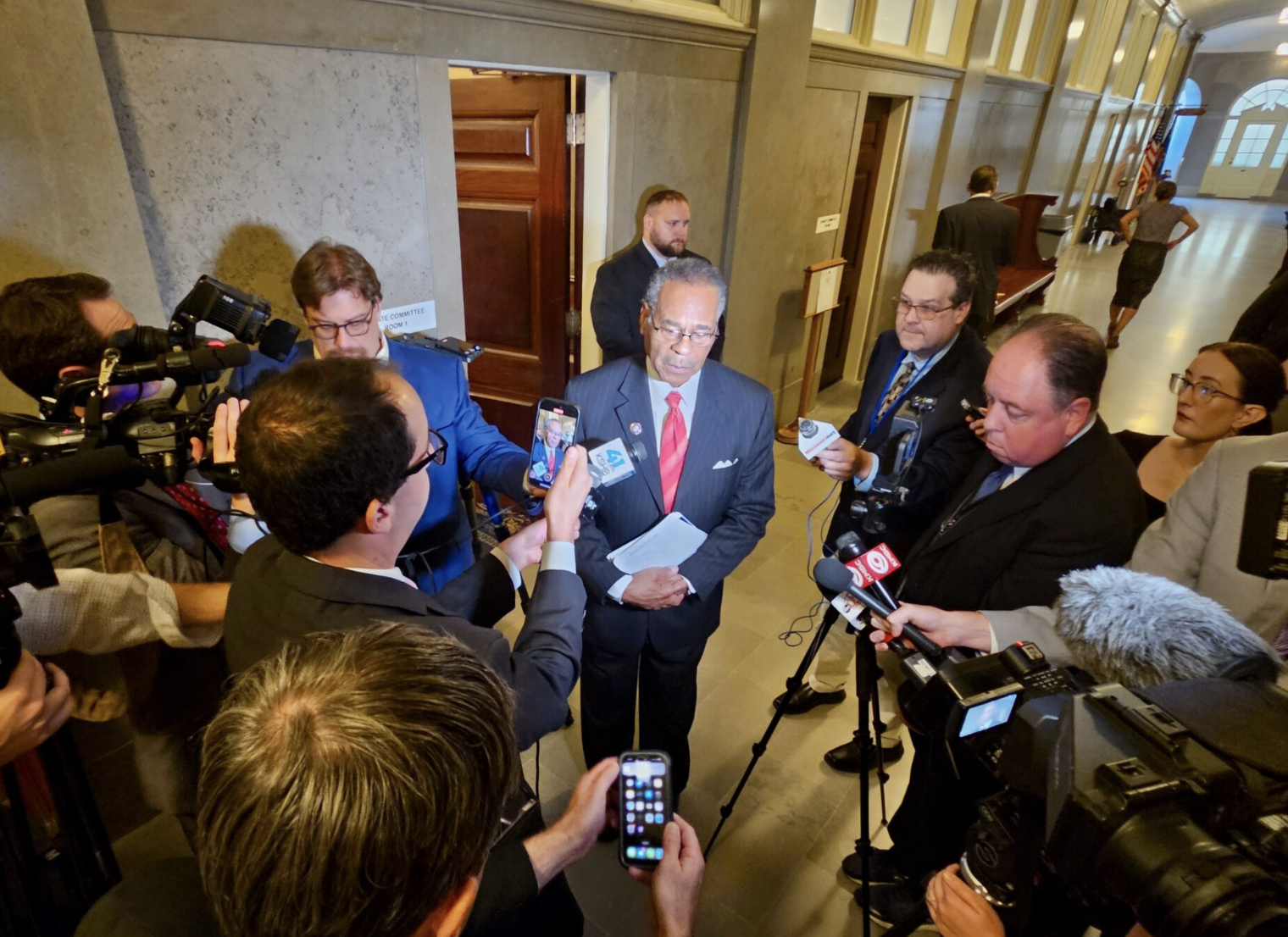
The Democratic congressman from Kanas City skipped votes in Washington to testify, but the panel advanced the proposed new map a few hours later
BY: RUDI KELLER
Missouri Independent
U.S. Rep. Emanuel Cleaver warned Missouri lawmakers Thursday that the effort to redraw the 5th District seat to favor Republicans will be long remembered by voters who resent being swapped by politicians seeking to increase their power.
Speaking to the Senate Local Government, Elections and Pensions Committee, Cleaver, a Kansas City Democrat, noted that Texas has already revised district lines this year to favor Republicans and California will vote later this year on a plan that favors Democrats.
President Donald Trump is demanding the changes to help Republicans keep their slim majority in the U.S. House of Representatives, and Democrats are fighting back in the states they control.
“If we fight fire with fire long enough,” Cleaver said, “all we’ll have left is ashes.”
Cleaver’s warning went unheeded and the committee, on a 6-2 party-line vote a few hours later, sent the redistricting plan, which has already passed the Missouri House, to the Senate for debate. By the same vote, the committee also approved a proposal altering how majorities are calculated for constitutional amendments proposed by initiative petition.
Both pieces of legislation will be debated Friday, with Republicans apparently ready to shut down debate as they did to push through rules changes on Wednesday.
During the hearing, Senate Minority Leader Doug Beck, a Democrat from Affton, said he expects little or no debate on Friday.
“They’re going to shut us down,” Beck said. “They’re not going to let us speak on this, because it’s inconvenient.”
There was some grumbling about the process from one Republican, state Sen. Joe Nicola of Grain Valley, who said he has been told he can speak on the floor about the legislation but that no amendments will be accepted.
“When I don’t have my voice, the 185,000 people I represent also lose their voice, and that’s extremely irritating to me,” Nicola said. “I’ve seen many processes here, and even recently, the rules being broken. And it’s just a shame. It’s a real shame for this institution.”
Nicola voted for both pieces of legislation in the committee.
Missouri has eight congressional districts, with six currently represented by Republicans. Cleaver represents the 5th DIstrict, which includes most of Kansas City and Jackson County. The other Democrat, U.S. Rep. Wesley Bell, represents the 1st District in St. Louis.
Cleaver said he skipped votes in Washington to make the rare appearance for a member of Congress before a state legislative committee.
“I chose to miss (Wednesday) votes, and I chose to miss the ones today, because I thought this was extremely important,” Cleaver said.
The 5th District, which he has represented since 2005, would be carved up, with portions attached to the 4th and 6th Districts while heavily Republican areas stretching along the Missouri River to Boone County, would be added to the remaining Kansas City portions.

Speaking to reporters after the hearing, Cleaver said he is saddened by the bill and the need to explain how he works to represent all points of view and work with Missouri Republicans in Congress on the state’s behalf.
Polling, Cleaver said, shows voters oppose the redistricting plan.
“This is immensely unpopular, so I was not just here representing myself,” Cleaver said. “I’m representing the people of this district.”
And, he said, he intends to seek re-election.
“A lot goes into making another decision,” Cleaver said. “But right now, I’m running.”
No one from the public spoke in favor of the bill. While state Rep. Dirk Deaton, a Republican from Noel who sponsored the bill, was testifying, he was challenged by state Sen. Maggie Nurrenbern, a Democrat from Kansas City, on the origin of the new map.
Deaton said it was drawn in Gov. Mike Kehoe’s office before the special session was called.
Nurrenbern said she did not believe it.
“I think it is a lot of BS what you guys keep doing, that you’re saying that this map was drawn in the state of Missouri,” Nurrenbern said. “We all know the truth, representative. We all know that this came straight from D.C.”
Deaton said he accepted Kehoe’s word that the bill was drafted in his office.
“People in Washington, D.C., as I’ve observed them, are not shy,” Deaton said. “If they had a map, I assume they would have been willing to put it out there and say, ‘we think this is a wonderful map. We hope Missouri would adopt it.’”
Final passage on Friday won’t automatically put the maps into place for next year’s election. The bill will take effect 90 days after the special session ends, but plans are being made by labor unions and others to seek a referendum, which would delay implementation until a statewide vote.
And opponents promised the bill will be challenged in court. The Missouri Constitution directs lawmakers to draw new congressional district lines after every decennial census. The current map was passed in 2022 and the next census is in 2030.
Denise Lieberman of the Missouri Voter Protection Coalition said she believes the constitution does not allow a new map to be imposed now.
“This map is also subject to a challenge under the Voting Rights Act for the dilution of African-American votes,” Lieberman said.
Cleaver is Black and the line chosen for part of the district boundary, Troost Avenue, was the line separating Black and white sections of Kansas City when housing segregation was legal, Lieberman said.
“This is an unprecedented power grab here in Missouri,” she said.
Initiative petition changes
The hearing on the changes to the initiative process brought some testy exchanges between Democrats and Republicans.
Currently, any proposal placed on a statewide ballot needs only a majority of votes to pass. That is the standard for constitutional amendments, statutory changes and proposals subject to a referendum.
The proposed changes, which would be on a ballot and subject to the current standard for passage, would only apply to constitutional amendments proposed by initiative petitions. Along with a statewide majority, those constitutional amendments would also need a majority vote in their favor in all eight congressional districts.
If one district opposed a ballot measure while the other seven passed it, as few as 5.3% of voters could control the outcome for the whole state.
“The main purpose is to protect the Constitution from changes that the majority of all the voters in Missouri, in every area of the state, don’t agree with,” said state Rep. Ed Lewis, a Republican from Moberly, as he presented the bill to the Senate committee.
As the committee was voting, Beck tried to make it subject to the same majority requirements it would impose on citizen initiative petitions.
“If this is such a great idea and we are going to change the constitution, and this is the best way to do it, why don’t we use that same standard for the legislature changing it as the initiative process,” Beck said.
State Sen. Rick Brattin, a Republican from Harrisonville, said Beck was being “too clever” and joined other Republicans in voting down the proposal.
“The whole point of this is to set those standards and to change those standards,” Brattin said, “but it has to be adopted by the current standard.”








